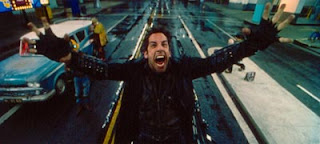"If you think a weakness can be turned into a strength, I hate to tell you this, but that's another weakness."
-Jack Handey
I posted this to facebook a couple of weeks ago and it spurred an interesting amount of debate.
Firstly, let me clarify the original statement. Basically it is saying that the inability to recognize a weakness is basically a weakness in and of itself.
Possibly the greatest weakness of all. Just as the ability to recognize weakness is an inherent strength.
But what is a weakness exactly?
Merriam-Webster says:
Definition of WEAKNESS
1: the quality or state of being weak; also : an instance or period of being weak <backed down in a moment ofweakness>2: fault, defect
It's the second definition that I intend to focus upon.
If you are strong in many things and "weak" in one area, that is only a relative weakness. You may be average in that area as opposed to your other strengths, which is technically NOT a fault or defect. However, if you truly do have a weakness, that area is BELOW the average or standard.
OVERCOMING WEAKNESS:
Now this is the part that stirs debate. When one has a weakness, they strive to eliminate, mitigate, or compensate for it.
A WEAKNESS WILL NEVER BE A STRENGTH AS LONG AS THE CONDITIONS WORKING AGAINST SAID WEAKNESS REMAIN CONSTANT.
If being a large reptile was a strength a billion years ago, the only things that changed that were the conditions surrounding being a large reptile. If those conditions returned, guess what?
Having a weakness that one works to their advantage is still not a reversal of that weakness. It is just an attempt to mitigate the negative impact of that weakness. One could argue that Zatoichi's blindness works to his advantage as his opponents underestimate him and thus present opportunities that they wouldn't give a sighted swordsman. This is true. But imagine how incredible Zatoichi would be with sight. Or how he would enjoy seeing a Sunset, cherry blossom, or beautiful face.
One could argue that the defining characteristic of humanity is the limited scope of our ability. Limitations and weakness are neither synonymous nor mutually inclusive. Humanity proves that by continually expanding our limits and overcoming our weaknesses.
One could argue that as the defining human trait.
Recognizing one's weakness is a strength. Seek to eliminate your weaknesses and inadequacies as opposed to trying to twist them to your advantage if possible. This is making the assumption that one has the choice. If not, accept the shortfall and understand it's impact on your world. marginalize it to the point where others question whether or not it is truly a weakness. Once that has been achieved, those conditions that place you at a disadvantage may indeed change. ;)












